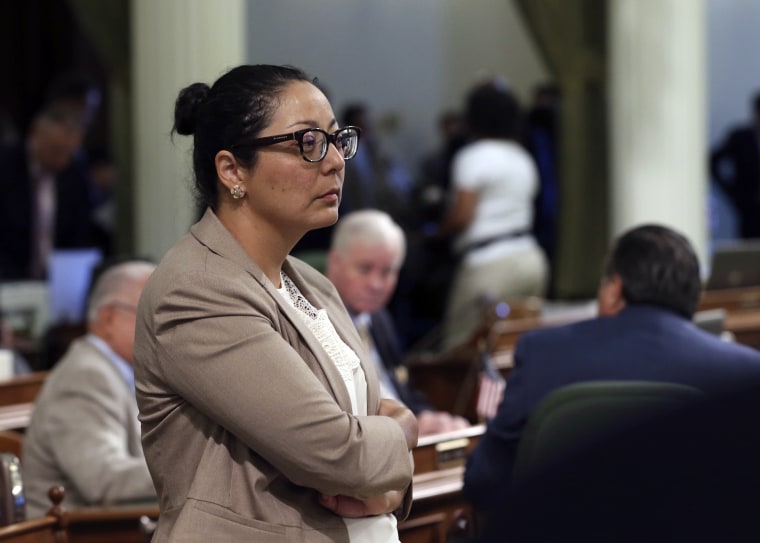A proposal in California to require adult pornography and webcam performers to be fingerprinted and obtain a license to work set off a firestorm this week, highlighting tensions among lawmakers, labor unions and advocacy groups for the industry.
Adult film actors immediately spoke out against the far-reaching bill after it was quietly unveiled Tuesday, prompting the legislation’s Democratic sponsors to promise by Thursday afternoon that they will remove the licensing requirements.
Under the proposal, AB 2389, adult performers would have to pay for and complete training every two years on safety, human trafficking and workplace rights, and provide fingerprints to go through a background check to get a license. It would also create a governor-appointed advisory committee, with half of the membership coming from the adult industry.
The idea for the bill, and its detailed provisions, came from Amanda Gullesserian, the founder of the International Entertainment Adult Union, a union for people in the adult industry. But it quickly became clear this week that the measure lacked support from some of the union’s board, as well as other unions and advocacy groups that represent these workers.
“This criminalizes us, that’s absolutely what it does,” said Alana Evans, president of the Adult Performers Actors Guild, a union for people who appear on camera in the industry, and a subsidiary of the International Entertainment Adult Union.
Cristina Garcia, a Democratic assemblywoman from the Los Angeles area and the lead author of the bill, said in a statement Thursday that she would remove the fingerprinting provision, but keep in place a required training course to make sure “workers in this industry receive up-to-date training about reporting workplace injuries, including physical abuse, sexual abuse and sexual harassment.”
Many advocates for adult performers say the legislation should be scrapped, not altered.
“There are so many problems with this bill, I think it would be better to start over,” said Mike Stabile, spokesman for the Free Speech Coalition, an adult industry trade group. “I’m not quite sure what the end goal of the bill is.”
Adult performers said that because occupational licenses are a public record, it would be dangerous to require them in their industry.
“Anonymity is a key component of sex worker safety, and publicly registering my legal name in a database of sex workers puts me at risk, when I am currently protected by the anonymity of my online persona,” said one webcam model who uses the stage name Annabelle Adams.
Garcia’s chief of staff Ashley Labar told NBC News that the language of the legislation was brought to them by the International Entertainment Adult Union, which had shopped around for a sponsor of the bill.
The International Entertainment Adult Union has faced criticism in the industry, in part for supporting Proposition 60, a failed initiative in 2016 that would have required the use of condoms in porn videos shot in California, and permitted people to sue performers and companies who failed to use them.
Lorena Gonzalez, an assemblywoman from Oceanside and the co-author of the new licensing bill, told NBC News that the International Entertainment Adult Union had pitched the legislation to her as a bill of rights for adult performers. She agreed with critics that the proposal needs to be overhauled. “I can’t support some of what is in the bill right now,” Gonzalez said.
While a copy of the union’s proposal for the new licensing legislation, obtained by NBC News, described it as a “bill of rights,” it also stipulated that applicants for a new adult entertainer license submit a full set of fingerprints, list their criminal history from the past three years and provide the address for each place they intend to work, among other requirements. Much of the language in the legislation mirrors the proposal.
Gullesserian, who is an exotic dancer and the founder of the International Entertainment Adult Union, was the one who lobbied for the bill. She said that all she wanted was to require that the state educate adult performers on issues they’ll face, from taxes and money management to preventing sexually transmitted diseases. She said that education needs to be a requirement, because, “If a person has a choice to be educated or not educated, they're going to choose to not be educated because they're lazy.”
Gullesserian said that all of the members of the union’s board were involved in multiple phone calls with lawmakers on the proposal. However, according to audio of a Thursday night meeting of the leadership of the union and the Adult Performers Actors Guild, several board members said they weren’t aware that Gullesserian was talking to legislators about drafting a bill.
The Adult Performers Actors Guild is now considering moving to a new parent union, officers said.

